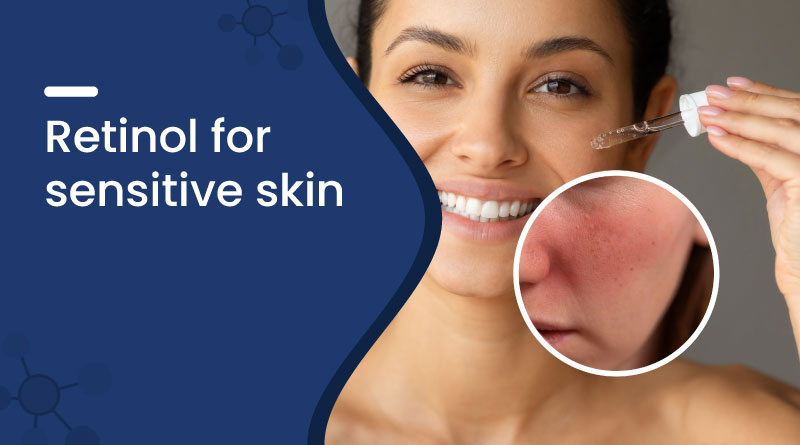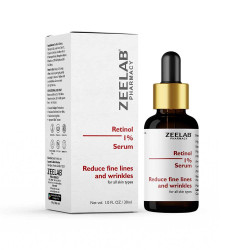Retinol for Sensitive Skin – Gentle Benefits & How to Use


Retinol is a gold-standard ingredient in skincare for treating acne, fine lines, and uneven skin tone. But if you have sensitive skin, you might be wondering — is retinol safe for me? The short answer is: yes, with the right product and approach, retinol can work for sensitive skin too. This blog will help you understand how to use retinol for sensitive skin, recommend a trusted product, and answer your top questions.
What is Retinol and How Does It Work for Sensitive Skin?
Retinol is a form of Vitamin A that boosts skin cell turnover, unclogs pores, and improves skin texture. For sensitive skin, retinol can feel too harsh at first — causing redness, dryness, or flaking. However, when used correctly and at the right concentration, retinol can be a game-changer even for delicate skin types.
How to Choose Retinol for Sensitive Skin?
When buying retinol for sensitive skin, consider the following:
- Low concentration (0.1% to 1%)
- Cream or serum base with hydrating ingredients
- Fragrance-free and non-comedogenic
- Formulated with soothing ingredients like niacinamide or hyaluronic acid
Look for a breakout-safe formula that hydrates while treating concerns.
How to Apply Retinol on Sensitive Skin Without Irritation?
Follow these tips for safe application:
- Start with 1–2 times a week at night.
- Use a gentle cleanser and avoid harsh exfoliants.
- Apply on fully dry skin to reduce irritation.
- Follow with a moisturizer to lock in hydration.
- Always wear sunscreen in the morning.
Which Is the Best Retinol for Sensitive Skin in India?
If you're searching for a gentle yet effective retinol, Zeelab Retinol 1% Face Serum is a dermatologist-recommended option. It’s specially formulated for Indian skin and works well even on sensitive types.
Recommended Retinol Product for Sensitive Skin
| Product Name | Uses |
|---|---|
| Zeelab Retinol 1% Face Serum | Fine lines, dull skin, acne marks |
Benefits of Retinol for Sensitive Skin
Retinol can offer the following benefits if used correctly:
- Reduces fine lines and wrinkles
- Fades acne scars and dark spots
- Improves skin texture
- Boosts collagen production
- Controls mild breakouts
For sensitive skin, the results may be slower but more sustainable when used consistently.
Also Read: Glycolic Acid for Sensitive Skin
Are There Any Side Effects of Retinol on Sensitive Skin?
Mild side effects like dryness, peeling, or redness can occur in the first few weeks. To avoid this:
- Use a moisturizer before and after application
- Avoid mixing with strong acids (like AHAs/BHAs)
- Use on alternate nights at first
- Perform a patch test before full application
How Long Does Retinol Take to Show Results on Sensitive Skin?
With sensitive skin, progress is gradual. Expect visible improvements in:
- 4–6 weeks for texture
- 8–12 weeks for fine lines and acne marks
Patience is key — slow and steady wins the race here.
Can I Use Retinol with Other Products if I Have Sensitive Skin?
Yes, but follow these rules:
- Skip exfoliants and vitamin C at night.
- Pair with ceramides, hyaluronic acid, and niacinamide
- Don’t layer multiple actives at once
- Stick to a minimalist routine for best results.
Frequently Asked Questions
Q. Can I use retinol every day on sensitive skin?
A. No. Start with 2 times a week and gradually increase based on skin tolerance.
Q. Should I moisturize after applying retinol?
A. Yes. It helps reduce dryness and irritation, especially for sensitive skin.
Q. At what age should sensitive skin users start retinol?
A. Start in your mid-20s for prevention or late 20s if you have visible concerns.
Q. Can I use retinol during the day?
A. Avoid using retinol during the day; it breaks down under sunlight. Use it only at night.
Q. What should I avoid when using retinol for sensitive skin?
A. Avoid products with alcohol, strong acids, and scrubs to prevent over-irritation.
Conclusion: Should You Try Retinol If You Have Sensitive Skin?
Yes — with the right formula, retinol suits sensitive skin. Choose products like Zeelab Retinol 1% Face Serum, which combine gentle strength with hydration, making it perfect for beginners. Start slow, stay consistent, and support your skin barrier — and you’ll unlock the many benefits of this powerful ingredient.
Recent Blogs
Disclaimer : Zeelab Pharmacy provides health information for knowledge only. Do not self-medicate. Always consult a qualified doctor before starting, stopping, or changing any medicine or treatment.

















 Added!
Added!